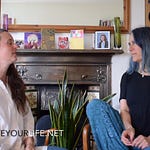Photo by Skyler Ewing
Dear Reader,
The shift in seasons over these last few days in the UK has been quite drastic. Drenching rain, howling winds, and a chilly breeze have put an abrupt end to the dreamy Indian summer we’ve been enjoying. Although I, like most other Londoners, bemoan the inclement weather, in truth I relish the change in energy. The spectacle of the rippling leaves with their hints and tints of golden red. The thrill of the wild wind and rumbling thunder. The earthy fragrance of soggy leaves nourishing the damp soil… Indeed, my mind is awakening from its languid summer torpor, I feel my senses sharpening.
A Time of Abundance
Also at this time of harvest and bounty, I’m feeling a heart-bursting gratitude for Life’s flavourful experience pouring in through my senses. The treasures of those little moments in life we observe or share: the soothing sound of a cat’s contented purr, a friendly warm smile, raindrops flashing bright in the sunshine; the blessing of a fridge full of healthy food.
Here is a poem by Ross Gaye, called Catalog of Unabashed Gratitude. It is long, but so moving, I cried just now re-listening to it. This poem, which truly captures the abundance and rich bittersweetness of Life, was introduced to me on separate occasions by both my partner Alistair and then my daughter Lucy.
Certainly, Life is nudging me to listen to, and share, these words.
Mature Gratitude
Some conscious choices are required to arrive at the mature, holistic view of gratitude that Ross Gay expresses in his poem. Maturity involves forgiveness, open-heartedness; open-mindedness; humility; a willingness to accept and correct wrongdoing; and to continually commit to learning and growth. This entails turning away from sticking our heads in the computer screen or some other sand. To step into the arena of the full sensory, embodied experience of Life in all its messy and marvellous glory.
Being in full acceptance of, and gratitude for what Life brings us, even when it is painful, difficult and tragic, is not necessarily easy. No one said Life would be easy… yet it is what we are here to do. To witness the great unfolding and to learn how to serve Life as best we can. To begin to build our capacity for resilience within the storms of Life we might start by contemplating the beauty of Nature. Gazing at the clouds drifting by; deeply listening to the song of a friendly robin; savouring the taste of a crisp apple and marvelling at the journey it made from seed to stomach. This comes naturally to many humans and is also a tantric practice. The Sages recognised that paying attention to Life in this way, enables us to connect with the sacred, inherent in all Life. This, in turn, gives us a glimpse of the sacred within ourselves.
Man’s Search for Meaning
“Everything can be taken from a man but one thing: the last of the human freedoms—to choose one’s attitude in any given set of circumstances, to choose one’s own way.”
Viktor E. Frankl, Man's Search for Meaning
For those of you who are unfamiliar with Victor Frankl, he was an Austrian neurologist, psychiatrist and a survivor of the Holocaust. He developed logotherapy, a school of psychotherapy that explores how a search for life’s meaning is the principal motivational force for humans.
Frankl’s book has a special significance to me. My mother showed me her copy of Man’s Search Meaning when I was in my late teens. Mum wasn’t that passionate about books, let alone psychotherapy books. I remember the moment she showed me it so clearly. She simply said, “This is a good book, very helpful and wise.”
Later on, when Mum had advanced Alzheimer’s, we found out from a relative that my mother had gone through some very traumatic experiences during her teens, which she kept hidden to herself. Mum had no one to support her during that time and no therapy later on to enable her to process the events. Like many people of her generation who had experienced trauma, she buried it deep within. I now realise how much of a lifeline this book might have been for Mum, and how it is a thread that connects her experiences to my future work as a Yoga Therapist. Her copy sits on my bookshelf, as a testament to that connection.
Self-agency is Inner Freedom
The assertion that we may continue to have agency despite facing dire circumstances is powerful. Nelson Mandela is an inspiring example of how much can be achieved with so little freedom. During his time in prison (1964 - 1990), despite the damage to his eyesight due to daily backbreaking work in the harsh brightness of the lime quarry at Robben Island, he read widely on many topics. He studied for a University of London Law degree and even founded the "University of Robben Island", whereby prisoners lectured on their areas of expertise, and debated socio-political topics. At times Mandela was only allowed one letter every six months and no access to newspapers, yet he found ways to forge and deepen connections with a vast array of people supportive of the anti-apartheid movement.
Choose (how to meet) Life
Life requires us to make choices, and to act we are called to decide. If we don’t decide we get trapped in a no man’s land, stuck on the fence, and we can feel frustrated, distracted and inert. Choice can be overwhelming in a time when truth is an ever-shifting concept and we are bombarded by a cacophony of conflicting opinions. Overwhelm can lead to depression and shutdown - too many choices, too many thoughts, too much that is wrong with the world. The feeling of having too much choice can seem as debilitating as having very little choice. In any case, if we don’t have a direction in life, a meaning or purpose to guide us, then it becomes very difficult to know how to move forward.
This is where yoga can help. Frankl shows us that whatever our circumstances we can choose how we meet each moment of our lives. Yoga, meaning not just asana, but breath practice, meditation and philosophical enquiry, strengthens our capacity to meet each moment with determination, courage and equanimity.
Revealing the Soul
In addition, the practices help us to gradually reduce the habitual responses and tendencies (samskara) that are embedded in our bodies and minds. This leads to a slow and subtle, yet nevertheless powerful revealing of our soul, which in yoga is called the atman. I wish to talk more about atman as the soul in future. I feel I’ve neglected the soul somewhat, due to my wish to appeal to the rational and scientific ethos which prevails in our culture. Yet, I’m realising that if we collectively continue to neglect the soul, we will be unable to properly address the problems we face in the world today.
The soul (atman) holds the blueprint of our purpose in life, our dharma. We might get glimpses of it during fleeting moments in childhood before we are acculturated by our family, schooling and society. The passions you had as a child or young adult might offer clues about the nature of your dharma. Or you might find your dharma much later in life as you find more freedom and time to explore new experiences. Dharma is the idea that each of us has a calling that only we may uniquely express. As such, we are all precious jigsaw pieces in the great puzzle of life. Each individual soul (atman) every one of us, holds a cherished gift, which we may offer to Life in the service of the whole manifest reality (prakriti).
Lack of Purpose and Modernity
Modern culture offers us a clunky, one-size-fits-all picture of dharma. As young adults, many of us have been guided by well-meaning adults to get a good job (well-regarded and well-paid); accumulate wealth and possessions; and raise a family. It is rare to find guidance in finding our dharma, our soul’s purpose. Perhaps this is due to the fear that our purpose might work at odds with our consumer culture. Hence, we find ourselves in the situation of spiralling consumption of the Earth’s resources, coupled with many human souls suffering from a deep lack of fulfilment. What little we have been taught about purpose in modern life is entirely wrong. Dharma is not about achievement, financial or otherwise. Dharma is not concerned with what we get or gain, it is concerned with what our soul wishes to give. It’s no wonder that in the modern world, we are so confused about the meaning of Life.
Yoga offers us many ways to reconnect with our soul and life’s meaning. And if you cannot devote the time to yoga, then perhaps ask yourself, what can you be devoted to? If not yoga then art, family, nature, music, gardening, religious community and dance, tai chi any task that engages you fully physically, mentally and spiritually, that induces joy, will nourish and reveal the purpose of your soul.
Classes are on as usual this week. It would be lovely to see you there!! :-)
You can book using the button below. Also, if you are considering coming to the one-day retreat at the end of October, it is very helpful to me if you book in advance rather than at the last minute.
With love and good wishes,
Julia xx
Londoners - Dates for Your Diary
October Day Retreat
Saturday 28th October 12:00 - 17:30, at Yoga Junction, London N8
Details and booking on my website












Share this post